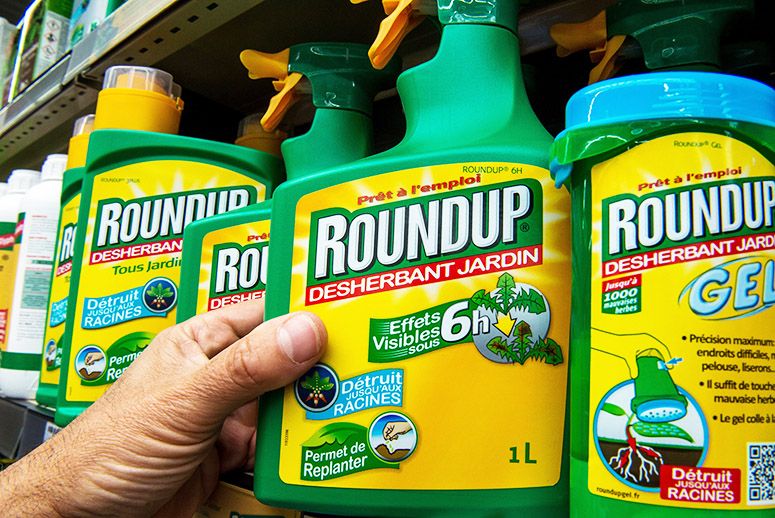18
Dec
France Withdraws Approval of 36 Glyphosate-Based Weed Killer Products
 (Beyond Pesticides, December 18, 2019) France is making headlines this month in the great, global glyphosate (Roundup) debate. Last week, the French health and safety agency, ANSES (Agence Nationale de sécurité sanitaire de l’alimentation, de l’environment et du travail or the French Agency for Food, Environmental and Occupational Health & Safety), made preliminary decisions within its review of authorizations for the 69 glyphosate (Roundup) weed killer products allowed for sale in the country. ANSES called for immediate withdrawal of authorization for 36 of those products “due to a lack or absence of scientific data which would allow all genotoxical risk to be ruled out.” The agency also announced it has denied authorization of 4 out of 11 glyphosate-based products submitted for approval since January, 2018.
(Beyond Pesticides, December 18, 2019) France is making headlines this month in the great, global glyphosate (Roundup) debate. Last week, the French health and safety agency, ANSES (Agence Nationale de sécurité sanitaire de l’alimentation, de l’environment et du travail or the French Agency for Food, Environmental and Occupational Health & Safety), made preliminary decisions within its review of authorizations for the 69 glyphosate (Roundup) weed killer products allowed for sale in the country. ANSES called for immediate withdrawal of authorization for 36 of those products “due to a lack or absence of scientific data which would allow all genotoxical risk to be ruled out.” The agency also announced it has denied authorization of 4 out of 11 glyphosate-based products submitted for approval since January, 2018.
According to ANSES, the 36 pesticides taken off the market represent almost 75% of glyphosate-based products sold in France for both agricultural and non-agricultural uses. The agency strengthened its framework for requirements regarding glyphosate following the 2017 European Union (EU) re-evaluation and 5-year approval of the active ingredient glyphosate. ANSES now requires that companies provide additional data considering health and environmental risks, particularly regarding genotoxicity. The provisions mandate specific studies be carried out using “standardized and robust methods.”
French president Emmanuel Macron had promised in 2017 to phase out all uses of glyphosate-based weed killers by 2021, but in January of this year reversed himself, stating, “I’m not going to lie to you, it’s not true.” During a public debate, he said that if the ban moved forward he would be “completely killing some sectors.” After that declaration, advocates vowed to use a January court decision to go after glyphosate-based products in the market; A court in Lyon ruled at the beginning of the year that the 2017 approval of Roundup360 had not respected a “precautionary principle” in failing to consider potential health risks. From the recent evidence, it seems that the tactic is working.
Glyphosate is a broadleaf herbicide that is determined a “probable carcinogen” by the World Health Organization. It has garnered worldwide controversy due to environmental concerns and high-profile lawsuits. However, government action has been hard-won in only some countries. In Europe, particularly, the deliberation on this popular toxic product is lively. In 2018, six ministers of agriculture or environment from France, Belgium, Greece, Luxembourg, Slovenia and Malta signed a letter to EU officials asking for the EU executive to conduct a study and investigate alternatives. They asked for an “exit plan” from the use of glyphosate-based products.
Some countries within the EU have gone further by taking matters into their own legislation:
- Austria: Austria announced a plan to ban glyphosate within the year in June of 2019 and was set to implement the ban beginning January 1, 2019. However, a legal roadblock popped up in December of 2019 because the country didn’t notify the EU’s executive commission of the draft law. It is not immediately clear what will become of the ban.
- Belgium: Proposed ban on individual, non-professional use of glyphosate in 2017 and began enforcing the ban in 2018.
- Czech Republic: Put strict restrictions on the use of glyphosate in 2018. The Agricultural Minister Miroslav Toman stated they “will only be employed in cases when no other efficient method can be used.”
- Denmark: Applied new rules in 2018 restricting use on post-emergent crops.
- France: President Emanuel Macron promised a ban by 2021 but has since retracted that deadline. 36 of the 69 glyphosate-based products being reviewed by the health and safety agency ANSES have been banned.
- Germany: Bayer’s home country is in the process of phasing out glyphosate use, to end in a permanent ban in 2023.
- Italy: The Ministry of Health banned glyphosate use in public areas and as a pre-harvest spray in 2016.
- Netherlands: Instated a ban on all non-commercial uses of glyphosate-based herbicides in 2015.
With all the increased attention on glyphosate and its risks, there is more reason than ever to advocate for its elimination. However, Beyond Pesticides, invites the public to beware of replacements — a different toxic pesticide is not necessarily better. We urge those concerned about glyphosate exposure to support organic systems that do not rely on hazardous, carcinogenic pesticide alternatives. To learn about all the reasons to “go organic” and advocate for organic integrity, see Eating with a Conscience and Keeping Organic Strong.
All unattributed positions and opinions in this piece are those of Beyond Pesticides.
Sources: Reuters, Bloomberg, Sustainable Pulse, Baum Hedlund Law











Go France and Europe. That is great news for a start and lets ban all pesticides of any kind. Let the wildflowers grow. Let’s redefine what beauty is and stop the madness.
December 21st, 2019 at 10:50 pm